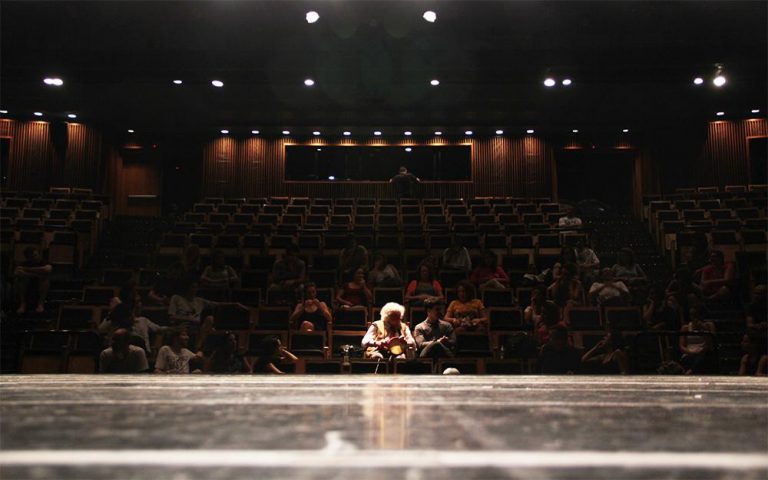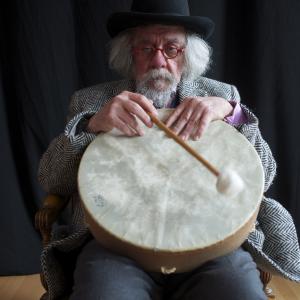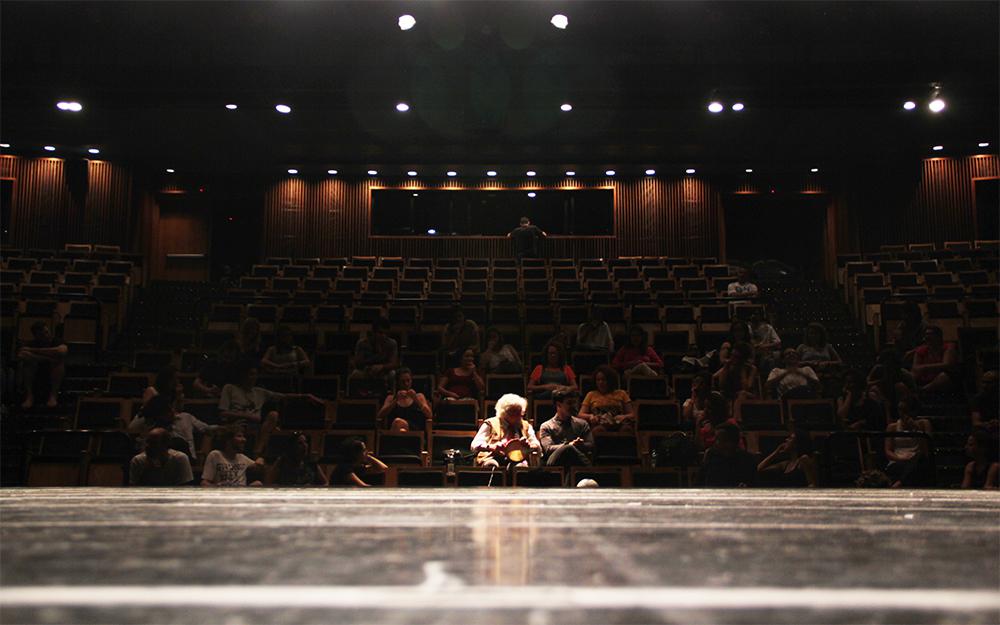Here are some of my experiences training in workshops with Phillipe Gaulier over five days at Trestle Theatre in July 2019. I haven’t detailed every exercise, only significant events, so if it looks like I didn’t do much on some days, that is because the rest of the day didn’t translate as well to interesting writing. I worked for four hours every day, and the whole week was excellent value for money.
Monday
When I entered the studio and took a seat with twenty-nine other people, it wasn’t long before Phillipe appeared. A short elderly man with a mass of grey hair and little round glasses. He spoke in a croaky, grumbly French accent.
The exercises were simple. Most of them playground games, but any time we messed up, bom-bom! went his drum. Then Phillipe would turn to the nearest student,
“Now this guy here… do you think he is boring, or is he fucking boring?”
This sort of comment happened every thirty seconds or so, but never without reason. Despite his bizarre appearance, Phillipe is sharp as a pin and effortlessly funny. I got up to do an exercise, and Gaulier addressed my partner.
“This woman. Would you go on holiday with her?”
“Er, yes, I think so.” My partner responded.
“Ahh… Then you are Jesus Christ, dying on the cross for the rest of us,” and everyone laughed at me.
But the atmosphere was never nasty. Phillipe’s clownish appearance and amiable voice makes him impossible to take seriously, and you soon realise it doesn’t matter that twenty-nine people are laughing at you, because in five minutes, he’ll be ripping the shit out of someone else while YOU sit by and laugh. It busted egos and put us all in the same boat.
That day we played a Slaps game. You and your partner lock eyes, and hold your hands palms up, theirs over yours. Then, you try to slap your partner’s palms, while they pull away to avoid you. The fun comes from eye contact.
“Look at your partner’s eyes,” says Phillipe, “are they the eyes of an actor, or are they the eyes of a fish, locked in a suitcase for sixty years in Vietnam?” This introduced us to the idea of complicité, which is the sense you and someone else are both in on the game, together.

ecolephilippegaulier.com
Tuesday
Today, we split into two groups and my half were first. We had to jump a big skipping rope one at a time, with no gaps. If all of us made it round, we started again with two jumps each. Me and a few others were so bad that we were moved to a separate group known as “the graveyard”. Remember this for later.
Next, we played Grandmother’s Footsteps. A group line up on the back wall, with Grandmother at the front of the stage. While Grandmother’s back is turned, the others creep up. If she turns around, they freeze. Anyone caught moving goes back. The first to tag Grandmother wins.
“Look,” said Phillipe, when everyone was frozen. “They hold the game in their body, and their eyes, even while not moving.” This concept carried to the next exercise in a more powerful way.
The ball throw game looks easy. A group gets up, music plays, and they dance around the thrower who has a football. The thrower finds someone to throw to, makes eye contact, and when the ball is caught, the music stops.
“Then you must look, as if to say, ‘thank you my little classmate for the game’ and turn to us with the same attitude with which you caught the ball. And then, you may speak a text.” said Gaulier. A text could be a memorised piece, or improvised.
I was fascinated by this. It worked with immediate effect on people who understood it. They turned to us, changed. A certain look in their eye, a gravitas. I realised later that a key part of this is having a genuine pleasure to be on stage, as well as the “thank you”, which lets you visibly take the game from someone else.
In improv, I’m used to the game of a scene being talked about as an abstract concept, that you fumble for in the dark. Phillipe talks about ‘game’ as a tangible force that is contained and moved between physical objects and people. I’m still thinking about what this might mean for the way I play games in improv in the future.
“If we do not see your pleasure of the game, we cannot feel pleasure in watching you.” said Gaulier. “You cannot be on the stage in the same way you buy your fish and chips.”
It all seemed old fashioned, but at the same time, it tapped into something ancient about that unique relationship between live actor and live audience.

ecolephilippegaulier.com
Wednesday
Today we played the echo game. All you do is speak a text, and imagine your voice is echoing off a huge cavern, and enjoy the game of it. I nearly got this one right, but suffered from my uninspired improv. Bom-bom! went the drum. Phillipe looked at me. “We do not want to hear about your shitty boyfriend, or your shitty family. Thank you.” And he moved on to the next person.
Watching this game done well was simple but gripping. A young man, who Phillippe mercilessly teased for his “pink half-trousers” improvised a Roman emperor-sort of text. It came across as if he spoke to hundreds, with a patient, regal tone to his words and presence.
We played the ball throwing game again today. And one young woman didn’t quite get it this time.
“Is she a brilliant actress or is she a primary school teacher?” Phillipe turned to us, “someone give her two chairs, and I need four people.”
The girl was directed to sit with her feet up, and to speak her text while the other four tickled her. I was baffled. Last night on the phone I had insisted to my boyfriend Richard that I wasn’t in a cult, but now I wasn’t sure. The girl spoke her text.
“Twinkle, twinkle, little st– ha!” And the moment she lost control to giggles, her stiffness dropped away, breaking her into a helpless smile.
“In that moment you were beautiful,” Phillipe said, afterwards. “Everyone can be beautiful on stage. Everyone. But there is no recipe. Every actor is different. And it is the job of the teacher to say ‘this doesn’t work.’ And you must find some other way.”
Part two coming soon…





